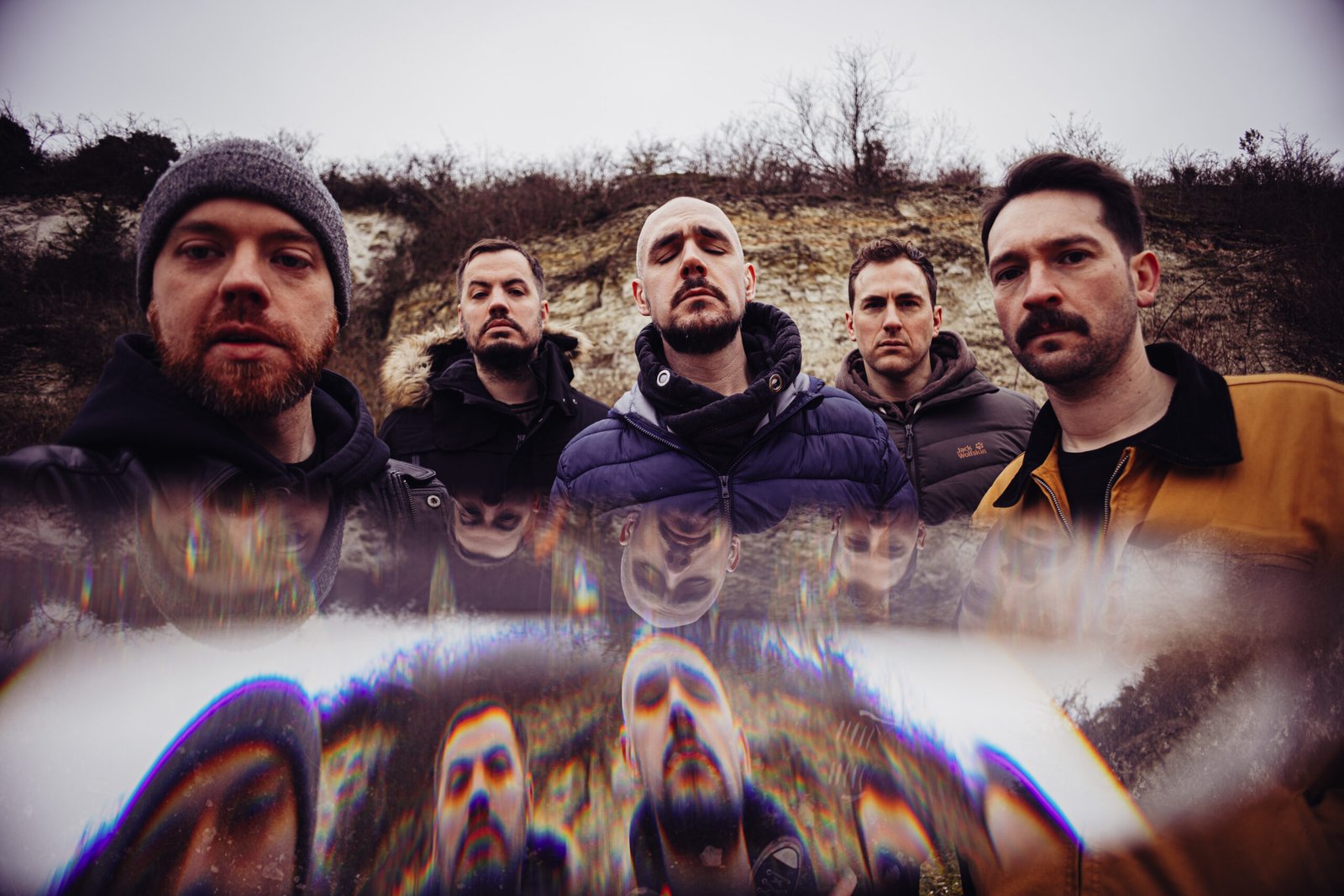Getting a chance to have a little chat with a band or artist that’s given me a bad case of the ear worms is pretty much the best reason to do a WFA. Sure, it’s great to give bands in your local scene some representation but there is nothing like digging a bit deeper an artist doing something that you think it truly cool. Indifferent Engine happens to be one of the those bands for me at the moment.
Surface level, Indifferent Engine are an angsty post-hardcore band from South England made up of four, sometimes five, high-strung blokes. Self-described as fiery and confrontational, they released their debut album, Speculative Fiction, in May, and hey, they even premiered their single “Crashing Into A Hillside In The Dead Of Night” with us in February.
Of course, it’s not hard to see that the group has a lot more going for them. A quick online search reveals they’ve released (and sold out of) the tape echo effect pedal which adds the same warbly lo-fi cassette vibe the band’s debut swims in. They’re also signed to Church Road Records, seemingly off the back of what have been described as ‘wild and extravagant live performances’, which are sprinkled with light, musical improvisation, and a ridiculous amount of CRT-TV monitors. Hell, we even reported in our premiere that the band is coming out with a video game inspired by and connected to the aforementioned single, “Crashing..”.
What the band is about seemingly can’t be fully realised through a quick description. To be honest, I had a close on 80 minute interview with lead singer, Adam Paul, and drummer, Alister Gibbons, and I only started to scratch the surface of what this band is trying to achieve. Paul, when asked about the various projects related to the group that they are working on said, ‘It’s that thing of just having as many strings in the bow as possible. I just call it the brute force approach. You just do so much different stuff and do it all under the same umbrella that you just always have something that you can be putting yourself forward with.’
But maybe we’re getting ahead of ourselves. Let’s start at the beginning. Indifferent Engine was started by Paul, initially, as a solo project, he said.
‘I started up about 10 years ago and it was mainly just because I’d been trying to be in a cool band and failing horribly. I always had this idea that if I just got good at my instrument and played with lots of bands that I would eventually end up in something good. Almost by accident or something. I think I got to the point where I realised that if I wanted something to happen, then I just had to kind of do it. So I started writing my own songs and putting them out. And, originally I was using session players. I didn’t sing because I’m not really a singer. So I kind of just wrote songs and I hired a guy to just do vocals on it. I think I switched at some point to singing because it just became too expensive to keep making music that way. I started basically trying to recreate the sound of bands that I really liked. It stayed that way for years, all the while trying to find musicians to come in and actually be in the band so we could go out and play shows. And it took years to actually get people together. I’d have a point where it’s like, oh, I found a drummer that wants to join, but then before I can find a bassist, the drummer loses interest and then you have a bassist but no drummer. Finally, through mostly luck, I think the right people just kind of clicked into place and that’s what the band is now. And that was about five years ago.
‘It’s kind of morphed from being ‘let’s all go out and play Adam’s silly songs’ to an actual band that writes together and actually tries to make art rather than me just churning out whatever nonsense I write.’
Ali describes how he first came in contact with Indifferent Engine through a rehearsal space, saying:
‘This guy that ran a rehearsal studio put Adam in touch with me after I put up an Ad looking for a band. Before that point I’d had loads of other bands contact me, sending me their music and stuff, saying that they were looking for a drummer. I always try to pick things that sound new to me that I’ve not really heard anywhere else. Indifferent Engine were definitely like that. I think one of the things that stuck out the most to me from the first track I heard was that the drums were very odd.
‘I’ve listened to heavy music most of my life, but I’ve never actually been in a heavy band before. Not that, not that. I mean, I wouldn’t say we’re like the heaviest band going, but like from all the bands that I have been in. This is definitely the heaviest one but I think there’s a lot more room for creativity. The last band that I was in was very radio friendly. Like playing to a click and using backing tracks and everything had to be in key. You know, I mean I’m not knocking that at all. Indifferent Engine doesn’t work like that.’
Fundamentally, Indifferent Engine are a post-hardcore band by-way of analog nostalgic soundscapes. But if you want to know their one true influence you don’t have to think too hard. Adam openly admits that his bar when trying to create songs as a budding solo project was to make something that ‘when you ear squint and the song sounds something like what At The Drive-In might have released in the late 90s’.
‘I did go through a period where it was like, okay, I’m just trying to recreate that to have something to aim at to make the songs better. And then once I got to that point, I kind of was like, okay, well, these songs, they’re not as good and never will be, but they’re a good start. Now I need to do something that isn’t that with it. That coincided with other people joining the band and Ali, Alex, and Ellis were more willing to be like, oh, I’ll give this a try, because these songs aren’t terrible.
‘The overarching idea was to do something new with it and go somewhere, just basically explore creative ideas that we dream up. and that’s when that kind went that way. It’s been going on a trajectory that is our own thing. I think it’s partly because I’d kind of got to a point where I was a bit more confident in my songwriting and partly because the other guys were just good and they just brought something else to the mix.’
Hearing Adam and Ali discuss the band’s creative direction, it’s easy to understand how they reached the sound they have on Speculative Fiction. They aren’t tied down by genre baggage or believing they have to sound a specific way. There are mirages of post-metal, noise rock, and progressive metal across the album. Uncomfortable moments of noise and weird tape effects bookend songs. Oddly enough, there is a certain amount of comfort that can be found in the warmness of feedback, in the same way listening to white noise can be meditative. Adam admits,
‘I wasn’t in a band like this beforehand and I don’t think the other guys, like Ellis, he certainly wasn’t really in bands like this before. People might think that would be a weakness but actually I think that’s kind of a strength that we’re coming at it in a way that’s different to other people because we don’t come in with any kind of preconceived idea of like, oh, this kind of music is supposed to be like this and it’s supposed to go like that and you’re supposed to do these things. We’ve just kind of like organically made this thing that’s this Indifferent Engine organism that’s kind of composed of just the parts that we brought to it rather than kind of external ideas of like, oh, this is going to be a hardcore band or it’s going to be a post metal band. You know what I mean? We’ve just kind of found our own way with it and it’s kind of developed its own personality.’
If the music doesn’t convince you that Indifferent Engine are trying to set themselves apart then their live shows certainly will. Part cathartic hardcore exorcism, part vintage TV auction, Indifferent Engine set out to ensure that people remember their shows. With each gig seeing the four piece lug vintage CRT-TVs onto the stage, filling the room with cold static that mesmerizes and confuses punters. Adam talked a bit more about the why behind the TVs, saying:
‘I’m really into that kind of retrofuturism, kind of like Cold War Era technology, tape machines and CRT-TVs and stuff. There wasn’t necessarily a direct connection to the music. I wanted our shows to be more. People could say that the songs are decent. That has to be the first thing. But then the live show is hectic and crazy. Then I just wanted to bring all these weird props that they just fill the venue with all this stuff that’s clearly not supposed to be there. CRT-TVs are great for it because they’re clearly very hard to move. Like, they’re very big, they’re very heavy, and they take up a lot of space. Because if you were like, using, like, flat screens or something, it wouldn’t look as cool. They’re so much easier to pack up in a car. It has to be something big and bulky and ridiculous so that it’s like the first thing people think when they get to your show is, how did they get this here? We did a show in a little pub in Kent. We just had TVs piled in front of the stage and it’s like you can’t really even see the band. There were probably only about 10 people at that show. But if you’re one of those 10 people, like, you’ll never forget it.
‘We want to elevate what we’re doing above the kind of thing that you would expect to see at this level of show so that people go there and they’re just like, I didn’t expect it to be like this, to be as big as this and as much as this. Basically, we want people to get absorbed into the crazy, hectic show that we do and they remember it and maybe they come see us again and maybe they check out our album.’
It becomes quite obvious during my chat with Adam and Ali that there are two distinct sides to the band. A considered, measured, yet chaotic side that they harness for their studio sessions and a more visceral, tightly-wound version that revels in the cathartic live release. Both Ali and Adam tried to describe the process, saying:
Ali: ‘I think that there’s an element of reverse engineering the way that we work in the studio. Because I think most bands will record music and then want to perform it to the quality that it was recorded. But with us, we want to achieve what we play live [on stage] in the studio.’
Adam: ‘Yeah, our live shows are quite different to what we do in the studio. We play live in the studio so there’s a lot of feel and emotion in it, but it’s also a lot more considered than when we play live on stage. It’s kind of a mess and it’s just a hectic, chaotic mess. The guitarist has to kind of play his parts with me, kind of like, wrestling his guitar out of his hands and stuff like that. We had a bit of an implosion where we’d been playing lots of shows and because our shows are very visceral and emotional and we’re all highly strung weirdos, we just basically were like, I need a break from playing shows. We just basically agreed we weren’t going to play shows while we went off and just worked on music in the studio.’
The time off from playing live and refocusing that energy into Speculative Fiction’s recording is something that seems to have paid off for Indifferent Engine. It’s a record of contradictions. Both well-constructed, thoughtful and highly conceptualised while the musical energy is emotive and unhinged. Adam’s ragged vocal delivery sits alongside unconventional guitar and drum structures all held together by reverb laden, echoing tape effects. There’s a feral beauty here that is not uncommon in post-hardcore, yet the group has managed to add progressive touches and lo-fi aesthetics, making this album an addictive listen.

Indifferent Engine is…
Adam Paul – lead vocals
Alister Gibbons – drums
Ellis Hale – guitar
Alex Wheatley – bass
Tom Wilson – guitar (sometimes)
If you enjoyed getting to know Indifferent Engine and liked their album be sure to pick it up on Bandcamp. You can keep up to date on any shows they are playing via their Instagram page. They also want you to know they are playing at ArcTanGent Festival in August so be sure to catch them there if you are going!





